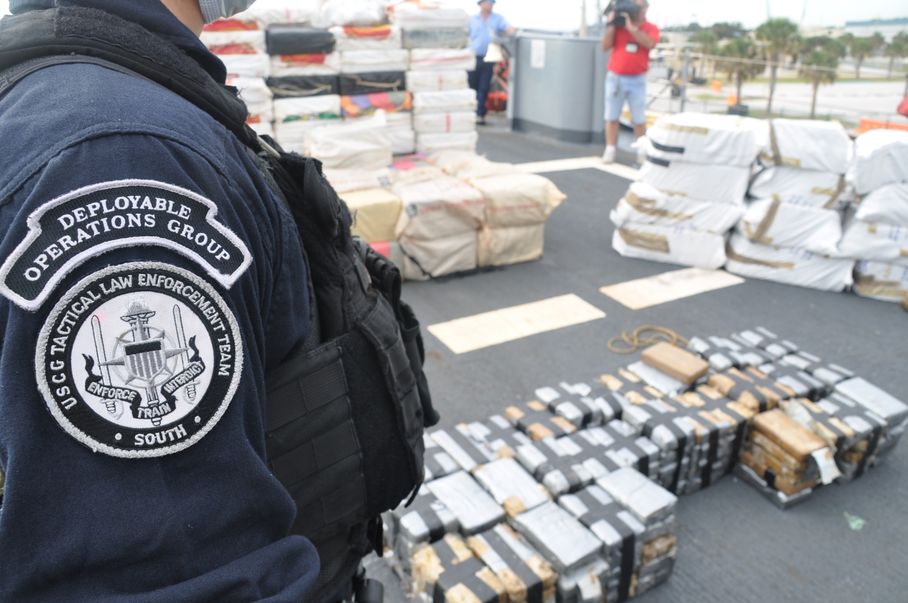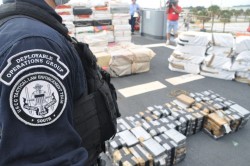
With the constant stream of news about maritime disputes in the Asia-Pacific, the threats of piracy, and bluster of the Iranians, it can be easy to forget about the regular naval drama in the Western hemisphere. The U.S. Navy’s contributions to drug interdiction efforts don’t get a as much press, but they are a major focus of naval operations up and down the Atlantic and Pacific coasts, and in the waters of the Caribbean. Yesterday Spanish-language station Univision helped shed light on the mission and its impact thanks access it was given to USS Nicholas (FFG 47).
This is the report from Univision and the English-version clip:
It’s estimated that over 80 percent of the cocaine entering the United States is transported during part of its journey by sea. For that reason, the U.S. Coast Guard has moved the battlefield in the fight against drug trafficking to the oceans.
Univision’s Ricardo Arambarri got exclusive access on board the USS Nicholas during Operation Martillo, a 175-day-long mission patrolling the Caribbean Sea and the Atlantic and Pacific coastal waters of South and Central America.
Arambarri and cameraman Herman Ulloa were on board for 10 days and witnessed the interception of a speed boat loaded with drugs. Operation Martillo returned to land on July 17th with four tons of cocaine and marihuana seized during the mission, with an estimated wholesale value of $93 million.”
This is some great footage, especially if you haven’t spent much time on a surface ship. It again highlights the benefits that mostly untrammeled access can achieve – namely helping generate an understanding of what it is the Navy does in the minds of the American (and international) public. Kudos to the PAOs and whoever else made the decision to give them the access.
According to WAVY 10, “Nicholas‘ crew seized a total of 16,000 pounds of cocaine and 500 pounds of marijuana during the deployment, worth more than $515 million…the crew also captured 14 suspected drug smugglers.”
Univision also provided some entertaining behind-the-scenes footage of the filming process:
This is also a reminder of how well the sea services can work together with practice. In addition to the Nicholas, a maritime patrol aircraft (MPA), an embarked SH-60B Seahawk helicopter, and a Law Enforcement Detachment (LEDET) of the U.S. Coast Guard along for the ride all make an appearance. It is sad, however, to see during the gun shoot and SCAT-team fire (yes, the military does love its acronyms, as the reporter kindly points out) that we still can no better than boxes for targets. They must have run through all their killer red tomatoes. But at least they have some non-combat expenditure allocation (NCEA) ammunition to shoot off, and at least the boxes look like they’re floating. While I’m all for going the inexpensive route, it was hard to tell how well a gunner was at hitting a target when the plywood from pallets we were using slipped below the waves after only a few rounds.
Another thing the videos reinforce is that speed is a big factor in ultimately catching the drug runners. But it’s the speed of the airborne assets that matter, not the surface vessel.
If you’re proficient with your Spanish, you can also check out the original Spanish-language production. As Univision notes, “Check out Navy officers speaking Spanish!”
LT Scott Cheney-Peters is a surface warfare officer in the U.S. Navy Reserve and the former editor of Surface Warfare magazine. He is the founding director of the Center for International Maritime Security and holds a master’s degree in National Security and Strategic Studies from the U.S. Naval War College.
The opinions and views expressed in this post are his alone and are presented in his personal capacity. They do not necessarily represent the views of U.S. Department of Defense or the U.S. Navy.

